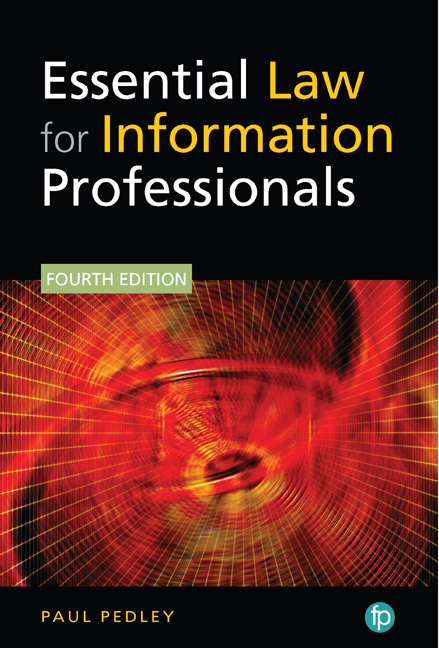Book contents
- Frontmatter
- Dedication
- Contents
- Disclaimer
- List of Figures and Tables
- Table of Statutes, Etc.
- Table of Cases
- Abbreviations
- Glossary of Terms
- Preface
- Chapter 1 General law and background
- Chapter 2 Library Law
- Chapter 3 Copyright
- Chapter 4 Legal Deposit
- Chapter 5 Breach of Confidence
- Chapter 6 Contracts and Licensing Agreements
- Chapter 7 Data Protection
- Chapter 8 Privacy
- Chapter 9 Freedom of Information
- Chapter 10 Human Rights
- Chapter 11 Re-use of Public Sector Information
- Chapter 12 Defamation
- Chapter 13 Professional Liability
- Chapter 14 Cybersecurity and Cybercrime
- Chapter 15 Disability Discrimination
- Chapter 16 Other Legal Issues Relevant to Librarians
- References
- Appendix 1 Brexit and the Orphan Works Exception
- Appendix 2 CILIP'S Ethical Framework
- Index
- Frontmatter
- Dedication
- Contents
- Disclaimer
- List of Figures and Tables
- Table of Statutes, Etc.
- Table of Cases
- Abbreviations
- Glossary of Terms
- Preface
- Chapter 1 General law and background
- Chapter 2 Library Law
- Chapter 3 Copyright
- Chapter 4 Legal Deposit
- Chapter 5 Breach of Confidence
- Chapter 6 Contracts and Licensing Agreements
- Chapter 7 Data Protection
- Chapter 8 Privacy
- Chapter 9 Freedom of Information
- Chapter 10 Human Rights
- Chapter 11 Re-use of Public Sector Information
- Chapter 12 Defamation
- Chapter 13 Professional Liability
- Chapter 14 Cybersecurity and Cybercrime
- Chapter 15 Disability Discrimination
- Chapter 16 Other Legal Issues Relevant to Librarians
- References
- Appendix 1 Brexit and the Orphan Works Exception
- Appendix 2 CILIP'S Ethical Framework
- Index
Summary
General principles
Libraries have an important role to play in raising awareness of and upholding human rights. Indeed, information intersects human rights and social justice in a number of significant ways, and libraries have had to address issues such as:
• Should internet access be seen as a human right?
• Is information literacy a human right?
• Considerations relating to the information rich versus the information poor.
• Freedom of expression and the challenge of censorship.
Jaeger et al. (2015, 1) say that ‘As information and related technologies have become increasingly essential to education, employment, social interaction, and civic participation, greater focus has been placed on the idea that information can be seen as a necessary human right and a core part of social justice’.
Sustainable development goal 16.10 (https://sustainabledevelopment.un. org/sdg16) of the United Nations is to: ‘Ensure public access to information and protect fundamental freedoms, in accordance with national legislation and international agreements’. Indicator 16.10.2 is the ‘Number of countries that adopt and implement constitutional, statutory and/or policy guarantees for public access to information’.
Meanwhile, Goal 9c of the UN global 2030 Agenda for sustainable development is to ‘Significantly increase access to information and communications technology and strive to provide universal and affordable access to the internet in least developed countries by 2020’. (https:// sustainabledevelopment.un.org/post2015/transformingourworld).
The raison d’etre of libraries is to provide access to information. Jaeger et al. (2015) believe that there are three distinct aspects to information access:
1 Physical. Of the three aspects, physical access is the one that has attracted the most attention: access to the document or other form of embodying information.
2 Intellectual. Going beyond whether someone has physical access to information, it is necessary to have intellectual access which means having the ability to understand how to get to the information and having the ability to understand the information itself.
3 Social. Simply because one can physically and intellectually access the required information, it does not necessarily follow that they do access that information or that all users interpret the information in the same way. Information behaviour is influenced by social trust, social motivation and social inclusion.
- Type
- Chapter
- Information
- Essential Law for Information Professionals , pp. 219 - 232Publisher: FacetPrint publication year: 2019



